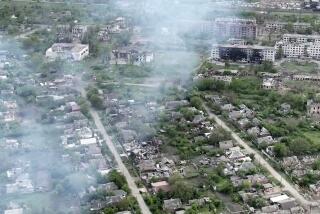Chechen Blast Shows Risks Facing Russia
- Share via
MOSCOW — A military convoy rolling past an abandoned car, a sudden blast and at least nine people killed in the explosion and a hail of bullets offered the latest reminder Wednesday of how difficult Russia’s quest to impose control over Chechnya has become.
The explosion of the booby-trapped car and the ambush that followed in the Chechen village of Oktyabrskoye, reported Wednesday by military officials, was one of the bloodiest incidents in weeks. Some analysts have predicted increased rebel activity before the Russian army hunkers down for its third winter of trying to eradicate separatists in the Russian republic.
“Although the information from neither of the sides can be trusted completely, there are objective signs that the military situation in Chechnya is deteriorating for federal troops,” said Pavel Y. Felgenhauer, military affairs expert with several Russian publications.
Rather than being cowed by the combined might of as many as 100,000 Russian soldiers, police troops and security agents, “the rebels’ resistance is growing,” said Felgenhauer. Rarely a day goes by without at least several casualties among Russian forces and Chechens aligned with them.
The ambush of the convoy took place Tuesday, said Vladimir Ponomaryov, a spokesman for presidential aide Sergei V. Yastrzhembsky, the main Kremlin source for information on Chechen matters.
As Ponomaryov described the attack, a military commandant’s vehicles were approaching Oktyabrskoye at about the same time as was an armored personnel carrier transporting Interior Ministry troops.
Near the town’s entrance, an explosive device apparently planted in the derelict car went off just as the armored vehicle passed. By all reports, the blast claimed the lives of four Interior Ministry servicemen riding on the vehicle. Within moments, the commandant’s convoy was caught in withering gunfire from rebels waiting in ambush.
Ponomaryov said he could confirm only the four casualties of the Interior Ministry soldiers and one Chechen fighter, but Russia’s Interfax news agency said 12 people were killed, including two members of the military commandant’s entourage and six residents of the town.
Russian television reports, meanwhile, put the total number of people killed at nine, including four rebels and one civilian.
Reuters news agency reached a rebel spokesman at an undisclosed location who claimed that 20 people died in the explosion and that Russian soldiers then killed five Chechen civilians. The spokesman said the explosion came from three artillery shells, not a car bomb.
There was no way to verify the conflicting accounts. Each side is thought to exaggerate opponent’s losses and minimize its own.
Russian forces reentered Chechnya in 1999 after accusing the elected Chechen government of backing an incursion of Islamic militants into the neighboring republic of Dagestan and setting off a series of apartment building explosions in Russia. Before the latest campaign, Chechnya had secured virtual independence by humiliating Moscow’s forces in a 1994-96 guerrilla war.
In addition to Tuesday’s fight, rebels in recent days claimed to have seized territory near the strategic town of Vedeno. Russian forces also have admitted that a lengthy operation in eastern Chechnya has so far failed to net Aslan Maskhadov, the president of Chechnya before Russia’s 1999 invasion, who now leads the separatist resistance and was thought to be hiding there.
Felgenhauer said he sees signs of “moral degradation” of the army and that he was growing more pessimistic about Russia’s prospects in the war.
He said the Chechens have fought on in spite of material hardships and lack of safe places for their fighters to assemble and train. They have been aided, however, by discord and jealousy between the various Russian services, leaks of information from the Russian side, and by harsh measures carried out by some Russian troops, which have hardened the will of many Chechens, he said.
Another military analyst, Alexander I. Zhilin, of the Moscow News, said he believes the Chechen rebels can be subdued but not for at least a decade.
“The Chechen rebels no longer have a unified chain of command, but they are no less active and dangerous because of that. The tactics are quite clear . . . to stage acts of terrorism wherever and whenever possible,” Zhilin said.
He pointed out that anti-Communist guerrillas harried Soviet troops in the Baltic states and Ukraine for a decade after the end of World War II. The Chechens have even more potential for keeping their fight alive. “Given the mountainous terrain,” he said, “federal troops cannot establish full control.”
*
Alexei V. Kuznetsov of The Times’ Moscow Bureau contributed to this report.
More to Read
Sign up for Essential California
The most important California stories and recommendations in your inbox every morning.
You may occasionally receive promotional content from the Los Angeles Times.













